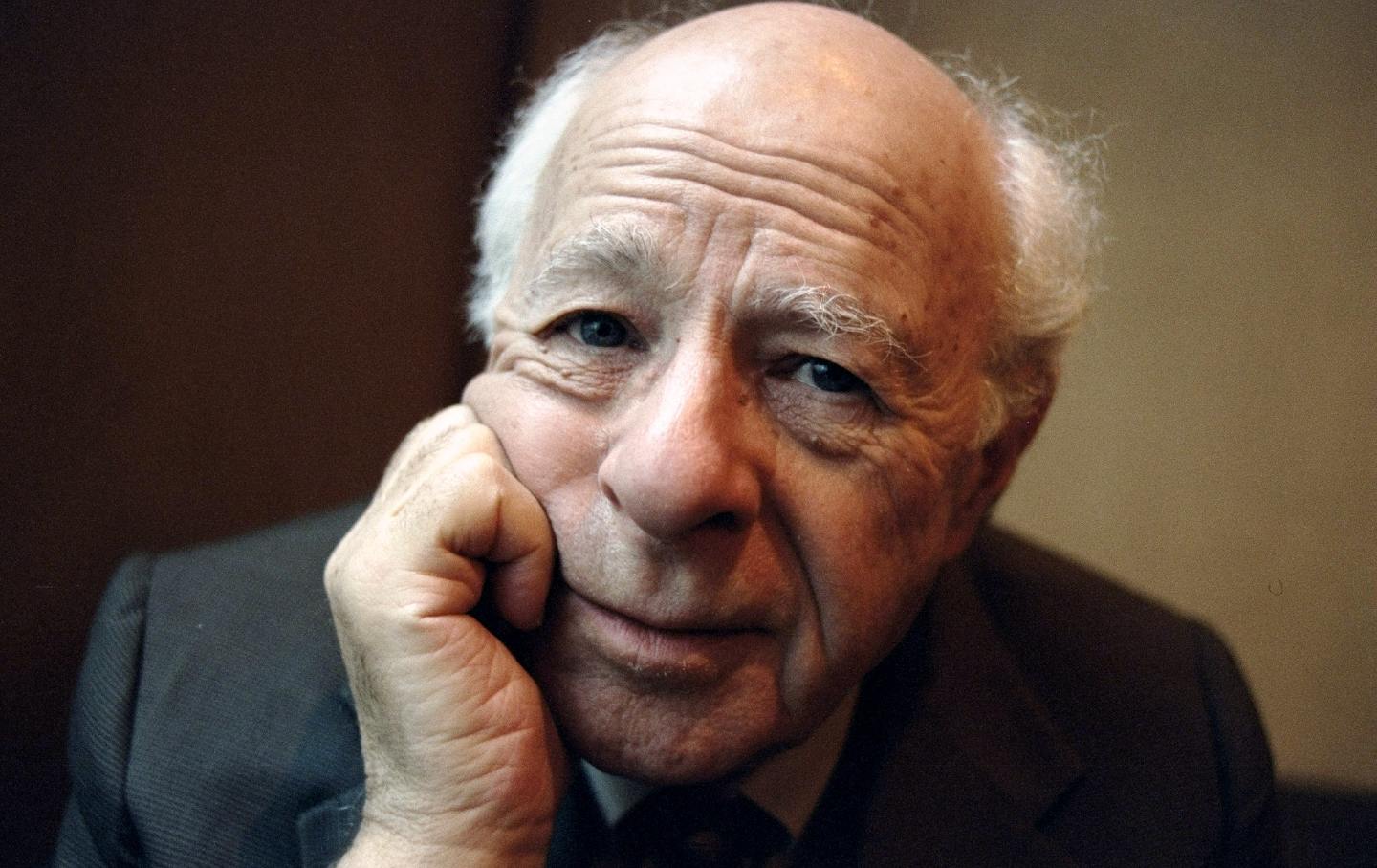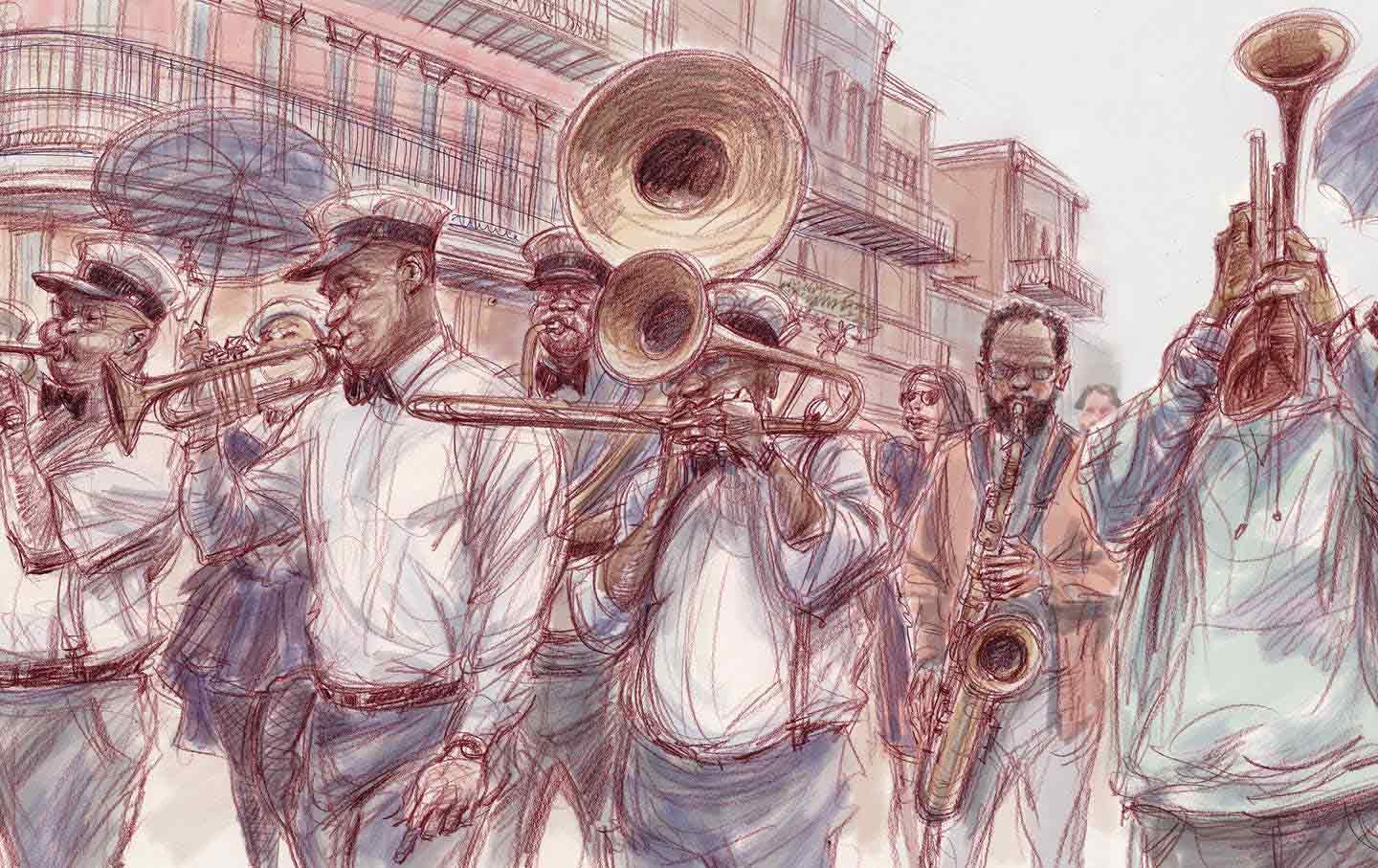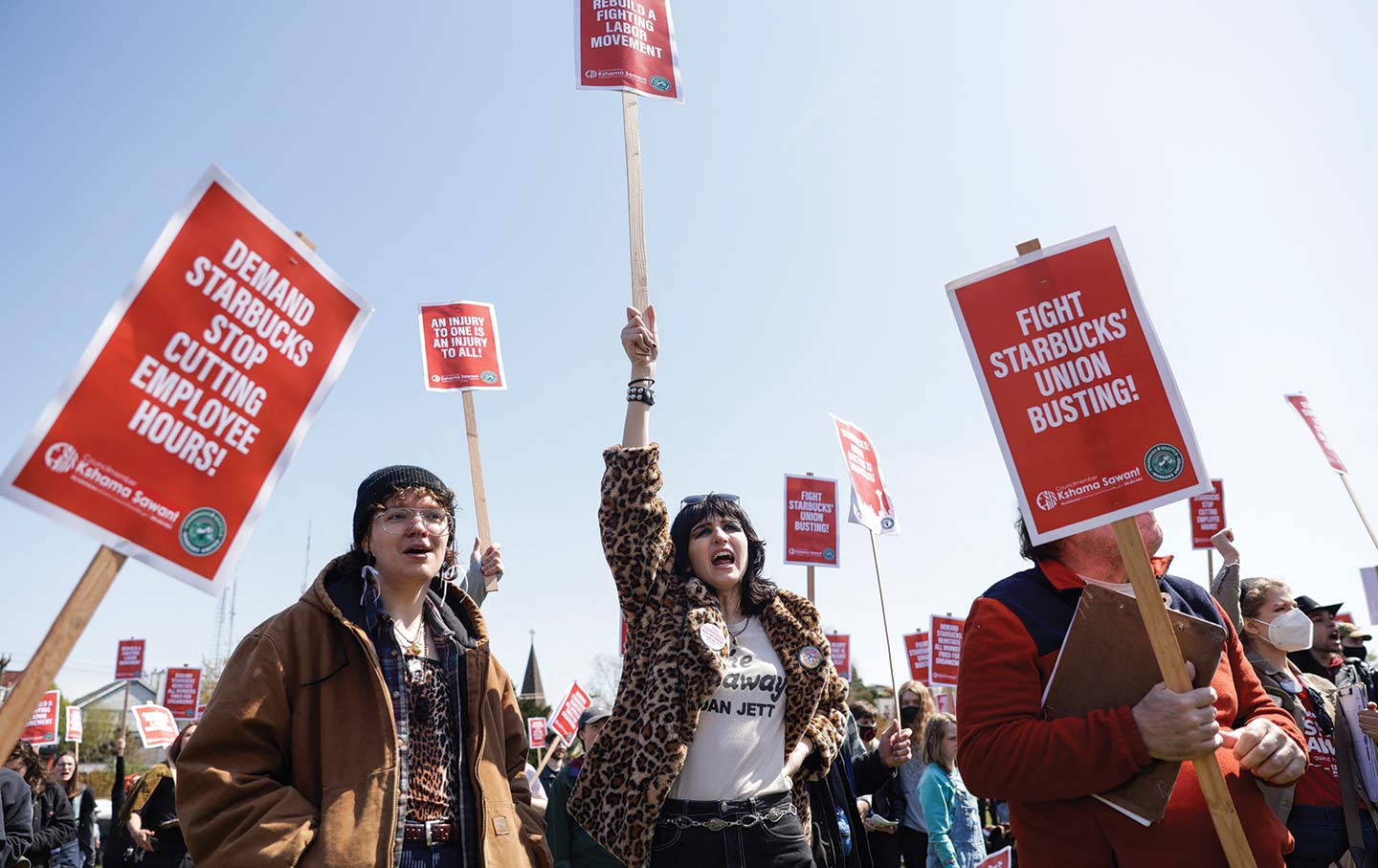Elon Musk Wants to Gut the National Labor Relations Act
Elon Musk is challenging the New Deal legislation that established the National Labor Relations Board. Experts warn that this is “a serious threat.”

Elon Musk hates unions, with a white-hot passion that has rendered him delusional. In late November, at a New York Times DealBook Summit where the aspiring-to-be-rich gather to get pointers from the actually rich, the Tesla CEO explained that “I disagree with the idea of unions…. I just don’t like anything which creates a lords-and-peasants sort of thing.” In the same interview, Musk—a mega-billionaire who famously threatened, in 2018, to take away the stock options of Tesla workers if they organized to exercise their collective-bargaining rights—griped, “I think the unions naturally try to create negativity in a company.”
When the second-richest man in the world is complaining that giving employees a voice in their workplace creates negativity and “a lords-and-peasants sort of thing,” we’re definitely through the looking glass. (See Bryce Covert’s new feature about the racism, sexism, and other workplace abuses that plague Tesla’s factory floors.) But Musk is hardly the first billionaire manufacturer to flip out over the prospect of having to treat workers with the respect that the law requires. Unfortunately, this billionaire isn’t satisfied to simply rant and rave; he’s now in the courts with a challenge to the New Deal legislation that established the National Labor Relations Board, conveniently filed before the NLRB hit his company SpaceX with a complaint in late March about unfair labor practices. If Musk gets his way, this scheme to gut the National Labor Relations Act of 1935 could destabilize a wide range of federal enforcement agencies that administer laws regulating everything from workplace safety to environmental conditions.
“It is a serious threat—very!” said Sara Nelson, the international president of the Association of Flight Attendants-CWA, AFL-CIO, speaking to The Nation. What makes it so serious is Musk’s deep-pocketed legal strategy, which taps into the same line of thinking that animates Federalist Society memos and the game plans of Donald Trump and Steve Bannon for “the deconstruction of the administrative state.” And Musk’s strategy has drawn legal support from other union-busting, billionaire-run enterprises, including Jeff Bezos’s Amazon, as well as Starbucks and Trader Joe’s.
In multiple court cases, Musk’s lawyers have argued that the NLRB—the independent federal agency that (to quote the agency itself) “protects the rights of most private-sector employees to join together, with or without a union, to improve their wages and working conditions”—does not have the authority to regulate his anti-union manipulations. The most serious of these challenges, a lawsuit filed in Texas earlier this year by lawyers for SpaceX, claims that the NLRB’s enforcement proceedings violate the corporation’s constitutional right to a jury trial. The suit also claims that the restrictions on the removal of NLRB board members and administrative judges—which keep them free from political interference when administrations change—violates the Constitution’s separation-of-powers provision.
Challenges to the constitutionality of the National Labor Relations Act have been litigated before, with the courts generally disregarding the specious arguments of anti-union employers. In the most famous of these rulings, a 1937 US Supreme Court decision in the case of NLRB v. Jones & Laughlin Steel Corp., as former Secretary of Labor Robert Reich reminds us, Chief Justice Charles Evans Hughes, who ran as the Republican presidential nominee against Woodrow Wilson, held in 1937 that Congress had the constitutional authority to approve the act and to establish the NRLB to enforce its provisions. Now, says Reich, “modern-day robber barons Jeff Bezos and Elon Musk want the Supreme Court to reverse its 1937 ruling and return America to a time before workers had the right to form unions.”
Musk and Bezos could be dismissed as dead-enders refighting long-lost battles against FDR and the New Deal, but for the fact that Hughes has been replaced by the likes of Justice Samuel Alito, an anti-union zealot who makes no secret of his determination to overturn protections for workers and their unions. The modern Supreme Court has already undermined unions that represent public-sector workers, most notably with the 2018 decision Janus v. American Federation of State, County, and Municipal Employees. Does anyone seriously doubt that the court majority wants to make it harder for private-sector workers to organize, bargain, and engage politically? Nelson doesn’t. Alito, she says, has “been building the case for this for years.” Since 2012, when he wrote the majority opinion in Knox v. Service Employees International Union, Alito has established a pattern of advocacy that suggests that he—and presumably his conservative colleagues—are on the hunt for cases that could weaken a resurgent labor movement.
Musk and Bezos have the anti-union animus, and the billionaire resources, to fight this legal battle for years, and potentially to get it to the Supreme Court. They might be tripped up by a lower court, or by a split among the high court’s conservatives. But US Representative Mark Pocan, a cochair of the Congressional Labor Caucus and one of the few dues-paying union members in the House, says, “This is a huge threat, because Musk and Bezos are…trying to work through the courts rather than the legislative process. If they succeed, they could do incredible damage to worker rights.”
Were the high court to upend the National Labor Relations Act, Pocan argues, a motivated Congress could enact new protections for workers and unions, and the Senate could fill judicial vacancies with worker-friendly jurists. For that to happen, though, pro-labor Democrats would have to control the House, the Senate, and the presidency. “This is just another reason why the 2024 election matters,” Pocan says. “If we don’t have members of Congress who are willing to write rules that protect workers, and…members of the Senate who are prepared to confirm judges and justices who respect the rights of workers, these billionaires could get their way.”
Disobey authoritarians, support The Nation
Over the past year you’ve read Nation writers like Elie Mystal, Kaveh Akbar, John Nichols, Joan Walsh, Bryce Covert, Dave Zirin, Jeet Heer, Michael T. Klare, Katha Pollitt, Amy Littlefield, Gregg Gonsalves, and Sasha Abramsky take on the Trump family’s corruption, set the record straight about Robert F. Kennedy Jr.’s catastrophic Make America Healthy Again movement, survey the fallout and human cost of the DOGE wrecking ball, anticipate the Supreme Court’s dangerous antidemocratic rulings, and amplify successful tactics of resistance on the streets and in Congress.
We publish these stories because when members of our communities are being abducted, household debt is climbing, and AI data centers are causing water and electricity shortages, we have a duty as journalists to do all we can to inform the public.
In 2026, our aim is to do more than ever before—but we need your support to make that happen.
Through December 31, a generous donor will match all donations up to $75,000. That means that your contribution will be doubled, dollar for dollar. If we hit the full match, we’ll be starting 2026 with $150,000 to invest in the stories that impact real people’s lives—the kinds of stories that billionaire-owned, corporate-backed outlets aren’t covering.
With your support, our team will publish major stories that the president and his allies won’t want you to read. We’ll cover the emerging military-tech industrial complex and matters of war, peace, and surveillance, as well as the affordability crisis, hunger, housing, healthcare, the environment, attacks on reproductive rights, and much more. At the same time, we’ll imagine alternatives to Trumpian rule and uplift efforts to create a better world, here and now.
While your gift has twice the impact, I’m asking you to support The Nation with a donation today. You’ll empower the journalists, editors, and fact-checkers best equipped to hold this authoritarian administration to account.
I hope you won’t miss this moment—donate to The Nation today.
Onward,
Katrina vanden Heuvel
Editor and publisher, The Nation








